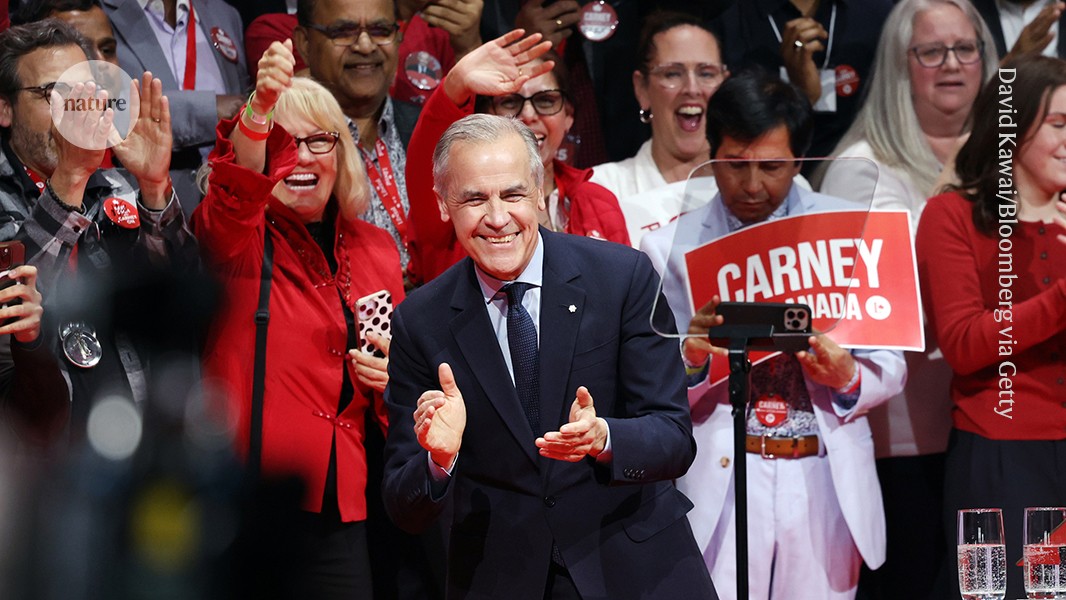Canada’s election: what Mark Carney’s win means for science

In turbulent economic times, the prime minister’s Liberal party has promised funding to attract research talent to Canada

Mark Carney, leader of Canada’s Liberal party, won a new term as prime minister on Monday. Credit: David Kawai/Bloomberg via Getty
Economist Mark Carney — leader of Canada’s centre-left Liberal party — will retain the title of Canadian prime minister following the country’s election on Monday. As Nature published this story, it was unclear by how much the Liberals had won, but the victory is being seen as a vote of confidence that Carney can fend off economic and other threats to Canada posed by US President Donald Trump.
Scientists are cautiously hopeful that Carney will be good news for the future of research in Canada — especially because of a fund proposed by the Liberal party to attract talent to Canadian universities and to help replace US science funding that has been cut by Trump.
“We’ve seen a strong commitment from the Liberal party in the past to science, and I hope that continues,” says Sarah Laframboise, executive director of the non-profit Evidence for Democracy advocacy group in Ottawa. But, she adds, the future of Canadian science and research is a bit unclear because the run-up to this election didn’t feature much discussion of them.
Stunning turnaround
Carney assumed the role of prime minister in March after Justin Trudeau, former leader of the ruling Liberal party, announced his resignation. Canada’s political landscape has swung wildly over the past year, with polls showing strong favour for the Conservative party, led by Pierre Poilievre, throughout all of 2024. After Trump put tariffs on Canada and spoke about the country’s future as the 51st US state, however, the polls shifted dramatically.
The meteoric rise of the Liberals was at least partly attributable to Carney’s economic credentials: the prime minister spent 13 years at investment banking company Goldman Sachs, was the former governor of both the Bank of Canada and the Bank of England, and is widely credited with saving Canada from the worst impacts of the 2008 financial crisis.

Carney celebrates his win at campaign headquarters in Ottawa early on Tuesday.Credit: Sean Kilpatrick/The Canadian Press via AP/Alamy
In the wake of Trudeau’s resignation, Carney called for a snap election to be held this month, well ahead of the usual October date.
Poilievre worried Canadian scientists earlier this month with his campaign promise to “put an end to the imposition of woke ideology … in the allocation of federal funds for university research” — phrasing that mirrors language Trump has used to justify slashing and freezing billions of dollars in US research grants and to cancel “radical and wasteful” diversity, equity and inclusion programmes. The official 2025 Conservative platform mentioned science only briefly, in the context of managing marine protected areas and investing in fisheries research.
Championing science
The official Liberal platform, by contrast, contains an entire section on “championing science and research”, including a promise to create a Canadian Sovereignty and Resilience Research Fund. “Where the U.S. is squeezing out researchers, we will look to welcome research here in Canada,” it reads. “If the U.S. cuts a researcher’s project funding, we will work with the Canadian research ecosystem if projects can directly help Canadians or be commercialized here.”
Canadian researchers say that this sounds great, but they are waiting for more details — including who exactly would get funding and how much. “This is very aspirational,” says Sean O’Reilly, president of the Ottawa-based Professional Institute of the Public Service of Canada, the labour union that represents federal scientists. No numbers or specifics have been mentioned by the Liberals as news of a US brain drain mounts. “They make explicit mention of attracting researchers to Canada. I’m excited about that,” says Rees Kassen, director of the Trottier Institute of Science and Public Policy at McGill University in Montreal. But, he asks, “how do we finance an increase in researchers in a system that’s already stressed?”
Enjoying our latest content?
Login or create an account to continue
- Access the most recent journalism from Nature's award-winning team
- Explore the latest features & opinion covering groundbreaking research
or
Sign in or create an accountdoi: https://doi.org/10.1038/d41586-025-01343-1
This story originally appeared on: Nature - Author:Nicola Jones


















